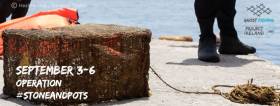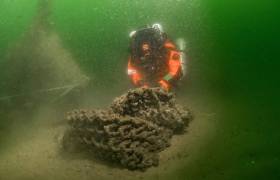Displaying items by tag: Ghost Fishing
Divers Recruited to Recover Ghost Nets in ‘Ireland’s Biggest Ever Beach Clean Underwater’
This year will see divers join in beach clean efforts in Ireland for the first time, using their skills to find and remove discarded fishing gear also known as ‘ghost nets’ from around the coast.
According to the Irish Examiner, marine conservation organisation Sea Shepherd has recruited a team of specially trained SCUBA divers who will take to the waters this spring to help tackle a hazardous situation that’s rarely visible from the shore.
“The biggest problem is not on the surface, it’s below the surface, and it’s the nets — 70 per cent of marine life entanglement is due to fishing nets being discarded,” said Sea Shepherd Ireland director Emma Tuite.
The campaign is being touted as “Ireland’s biggest ever beach clean underwater”, and the charity welcomes help from prospective divers as well as onshore volunteers to expand its reach.
The Irish Examiner has more on the story HERE.
Ghost Fishing: Enough Gear Lost and Abandoned in World’s Oceans Each Year to Stretch to Moon and Back, Study Says
Each year enough commercial fishing gear to reach the moon and back is lost or discarded in the world’s oceans.
That’s according to what’s being touted as the most comprehensive study ever conducted on lost fishing gear, as the Guardian reports.
Based on available data standardised interviews with hundreds of commercial fishers across seven countries, the researchers estimate that more than 78,000 square kilometres of nets are lost annually.
In addition, some 740,000 km of main long lines and 15.5m km of branch lines as well as billions of long line hooks and 25 million traps and pots are thought to be lost or abandoned every year — adding to a growing problem of ‘ghost fishing’ where fish, turtles and even larger marine mammals are trapped in such gear.
“This is having an unimaginable toll of unknown deaths that could result in population level effects for marine wildlife,” said Dr Denise Hardesty, who co-authored the study.
The Guardian has much more on the story HERE.
#StoneAndPots - Dutch divers are bringing their campaign against ‘ghost fishing’ to Galway Bay next month, as the Irish Examiner reports.
Previously covered on Afloat.ie earlier this year, the Ghost Fishing Foundation co-ordinates cleanups of lost or abandoned fishing gear that continues to trap marine wildlife on the sea bed.
From Monday 3 September, six technical divers from the foundation will embark on Operation Stone and Pots, removing lobster pots from the bottom of Galway Bay and returning them to local fishermen if they can be reused.
It follows a preliminary dive off the Galway coast this past May that revealed countless numbers of abandoned pots, which continue to pose a threat to sharks and smaller fish as well as crustaceans.
The Irish Examiner has more on the story HERE.
Project To Tackle ‘Ghost Fishing’ Scourge Coming To Ireland This Summer
#Fishing - Marine wildlife worldwide continues to fall victim to ‘ghost fishing’, trapped in lost or abandoned fishing gear.
The situation prompted a group of experienced divers, who often come across discarded nets and other debris, to form the Ghost Fishing Foundation — which co-ordinates cleanups in the US, the North Sea coast and the Mediterranean.
And this summer, as Coast Monkey reports, the initiative is coming to Ireland with the Big Ghost Net Removal Project.
Organisers are currently crowdfunding for the week-long cleanup which will see as many as 17 divers removing nets from the waters of West Cork, a popular location for dolphins and whales.
Coast Monkey has more on the story HERE.

























































